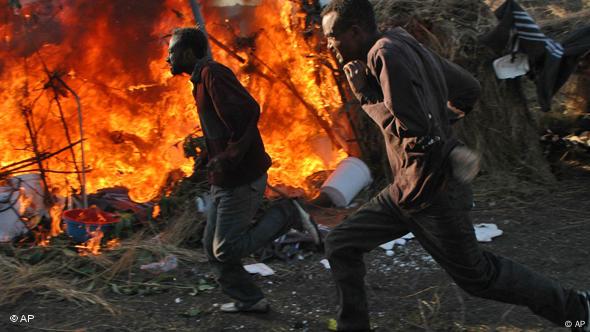Xenophobic violence resurfaces in South Africa

A number of recent violent attacks in South Africa have served as a reminder that xenophobic violence remains very much a reality in a country still struggling with attitudes towards migrants.
Four people were reportedly killed in the Soweto area of Johannesburg last week by angry protestors. Mobs looted and destroyed properties belonging to foreign nationals, many of them Somalis, who were accused of selling fake and expired food products.
The attacks come 10 years after a series of xenophobic riots spread across the country, leaving at least 62 people dead and tens of thousands displaced.
Social media helped fuel tensions
One of the victims of the attacks, identified only as Amir, described how up to 100 people descended on his shop, before beating him and looting all of his products.
"[It felt like] they were killing me by a stone in my head," he told DW. "Somebody was throwing me outside and then they were kicking me."
Abdirizak Ali Osman, the Secretary General of the Somali Community Board of South Africa, rejected the accusations that foreigners were targeted because they were selling fake goods and claimed the rumor started with a video posted on social media.

"No one from the relevant authority has verified [the video]," he told DW. "There are also messages running around in social media, saying that [they] don't want foreigners in their township, so they need to be chased."
Lebogang Maile, a member of the Executive Council for Economic Development in Gauteng, said the community's concern over the sale of fake products is genuine.
"We must get to the bottom of this to understand these dubious ways," Maile told DW. "[We need to know] where these things are being manufactured so the relevant law enforcement agencies can pounce on them."
Read more: Xenophobia has 'no place' in Africa
Government in denial
But Thifulifeli Sinthumule, Director of the Consortium for Refugees and Migrants in South Africa, strongly disagreed and blamed the government for failing to admit that xenophobia remains a serious issue.
"[What we heard from] the people on the ground, was 'we don't want these people'," he told DW. "Of course they're talking about the non-nationals that we would normally call foreigners. So this tells us that, down on the ground, people are not welcoming, especially on the South African side."
The government has been accused of sidelining the issue of xenophobic violence in South Africa. After the 2008 riots it joined civil society and international organizations in committing to prevent future attacks. However, the government insists the latest attacks are not xenophobic in nature, but a contestation over living resources and opportunities.
Loren Landau, the Director of the African Center for Migration and Society at the University of the Witwatersrand in Johannesburg, agreed that discrimination against foreigners is to blame for the violence.
"We have seen over and over again than local groups organize business associations and political leaders to attack foreigners," he told DW. "I suspect that's what has been going on here as well."

Migrants used as scapegoats
Landau said that although many concerns in South African society are legitimate — such as unemployment, poverty and corruption — it has become easy for many locals to shift the blame for their problems onto migrants, rather than the politicians.
"The concerns are legitimate, but the accusations against foreigners are not," said Landau. "If you look at the scope of the problem, the levels of inflation and unemployment for instance, foreigners cannot simply be responsible for all of these things."
Even more worryingly, politicians are increasingly likely to attempt to make gains from the rising anti-migrant sentiment — especially with the looming presidential elections next year.
"Politicians have learned from this," said Landau. "They have learned from the streets that they can advance themselves by making claims against foreigners and distract people from what they have not done. It's an easy excuse for things which are very difficult to deal with. So the more politicians say it, the more people are likely to believe it, but what we all need to understand it that this is a strategy of distraction."
Read more: Report: Immigrants no threat to jobs in South Africa
Somali community targeted in attacks
Although all foreigners in South Africa face the risk of violence, the Somali community has been increasingly targeted for robbery and violence.
Somali entrepreneurs — many of whom emigrated to South Africa in the 90s — have been highly successful in the commercial sector, creating employment opportunities for themselves by offering goods to customers at lower prices than many of their local competitors.
Although envious South African business owners have been blamed in part for inciting tensions with Somali communities, Landau thinks the problem goes much deeper.
"I think it's very clear — and South Africa is not alone in this if you look at the United States, Europe an Brexit — all around the world people blame outsiders. They blame them for damaging society, for stealing jobs. This is not going to go away until we address some serious issues."
Ineke Mules contributed to this report.